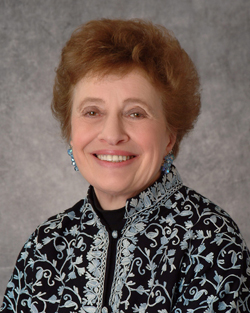FAYETTEVILLE, Ark. – Proposed national education standards don't reach the level of the standards already in place in top-achieving states, including California, Indiana, Massachusetts and Texas, according to University of Arkansas professor Sandra Stotsky.
Stotsky co-authored a critique titled "Fair to Middling" with mathematician James Milgram of Stanford University in which they analyze the standards proposed for nationwide adoption in the Common Core initiative of the National Governors Association and the Council of Chief State School Officers.
Stotsky moderated a forum last month at the Northwest Arkansas Education Service Center in Farmington that drew 120 people interested in information on the proposed standards, including local and state education officials. Another forum was held May 6 in Jonesboro in partnership with Arkansas State University, and a third one is planned for 5 to 8 p.m. May 12 at the State Capitol in Little Rock.
Stotsky and Milgram are both appointed members of Common Core's Validation Committee. In the critique, Stotsky said the proposed standards for college readiness in English language arts do not generate sound grade-level academic standards, especially at the high school level, or provide the basis for reliable and valid common assessments. The paper can be found online on the Pioneer Institute Web site.
"Whether national standards ensure that all students learn the knowledge and skills they need to compete in the 21st century global economy depends on the quality and rigor of those standards," Stotsky said. "We wrote this paper to show that more work needs to be done on the proposed standards and to urge educators and others to involve themselves in this process. If national standards are approved, they will have significant policy and fiscal implications for states that adopt them."
Stotsky joined the faculty of the College of Education and Health Professions in 2007 as the holder of the Twenty-First Century Chair in Teacher Quality. She served as senior associate commissioner in the Massachusetts Department of Education from 1999 to 2003, during which time she directed complete revisions of the state's licensing regulations, licensure tests for K-12 educators and pre-K-12 standards in 10 subject areas. These revised standards are considered to be a major factor in the state's leading position on both the reading and math tests for grades 4 and 8 given by the National Assessment of Educational Progress.
In the critique, Stotsky set out five recommendations to strengthen Common Core's proposed standards for English language arts:
- Replace the 10 "culture-free and content-empty" standards with standards proposed in 2003 by David Conley of the University of Oregon and with standards found in Achieve's American Diploma Project. Conley recommended that students be familiar with major literary periods of English and American literature and the major works of American and British authors as well as with authors from literary traditions beyond the English-speaking world. The education reform organization Achieve launched the American Diploma Project Network to promote career and college readiness as a priority for states. The American Diploma Project standards require mastery of standard English and being able to follow directions, answer questions, summarize and paraphrase information, analyze speech structure and make oral presentations.
- Remove material on the “complexity” formula to guide teachers in the choice of texts because appropriately educated teachers should not need a formula to help them judge the complexity of the literature they teach.
- Completely revise the vocabulary strand in grades 6-12 and remove the pedagogically weak or useless standards.
- Remove all the “literacy standards for history/social studies and science” unless English teachers are given sufficient scholarly information on the historical context and political significance of the historical documents listed in the current draft for teaching students how to understand them.
- Aim for an appropriate balance of secondary-level reading and writing standards that makes sense to English teachers, strengthens the secondary English curriculum, and prepares all students for college. This draft has nine standards for literary reading and 10 for informational reading, an almost equal weighting that leads to an unbalanced high school English curriculum. The draft also divides composition into three equal sets of standards: one for narrative writing, another for argumentative or opinion-based writing, and the third for informational or explanatory writing, an equal weighting that leads to a lack of balance through the grades. To make sense to English teachers, about 60 percent of the reading standards should address literary reading, and about 40 percent should address informational reading. To prepare all students appropriately for college, the bulk of student writing in the secondary grades should be analytical writing, to compensate for the inordinate stress on experience-based narrative writing in K-8.
Similarly, the proposed standards for math are less demanding and rigorous than those in several states and other English-speaking countries, according to the paper. The authors say their concern is whether final decisions have already been made not to align them with the most demanding math standards in this country and elsewhere.
Contacts
Sandra Stotsky, Twenty-First Century Chair in Teacher Quality
College of Education and Health Professions
479-575-7282,
Heidi Wells, content writer and strategist
Global Campus
479-879-8760,
